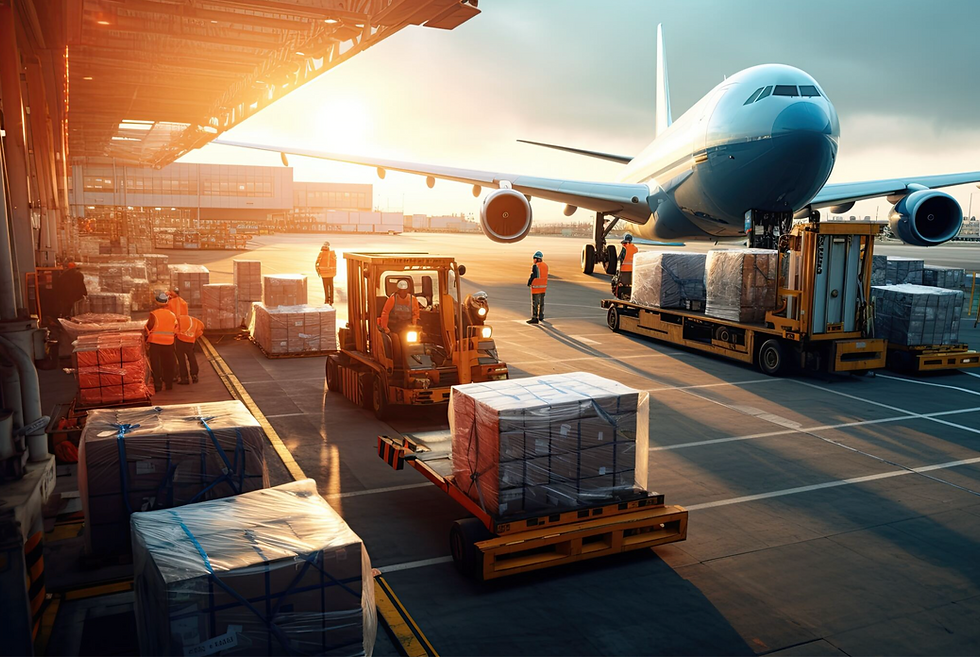FOB vs CIF: Incoterms Explained for Importers
- Vivien Zheng
- Sep 16, 2025
- 4 min read
Updated: Sep 17, 2025

When you start importing, you’ll quickly encounter Incoterms such as FOB (Free On Board) and CIF (Cost, Insurance and Freight). These terms define who is responsible for costs, risks, and logistics at each stage of the shipping journey.
For importers, especially those handling LCL (Less than Container Load) shipments, the choice between FOB and CIF can make the difference between cost transparency and unexpected bills.
At Beyond Borders, we’ve seen the challenges importers face firsthand. Our advice is simple: always ask your supplier to quote on FOB terms, especially for LCL shipments, and we’ll take care of the rest.
What Are Incoterms?
Incoterms (International Commercial Terms) are globally recognised rules published by the International Chamber of Commerce (ICC). They define:
Who pays for freight and insurance.
Who handles export and import clearance.
When risk transfers from seller to buyer.
The current version, Incoterms 2020, includes 11 terms. Four of them, including FOB and CIF, apply specifically to sea freight.
Think of Incoterms as the “rulebook” that avoids disputes between you and your supplier.
FOB Incoterms Explained
FOB (Free On Board) means the seller delivers the goods onto the vessel at the port of origin. Risk transfers to the buyer as soon as the goods are on board.
Seller covers:
Export clearance.
Delivery to the port.
Loading onto the vessel.
Buyer covers:
Ocean freight.
Insurance.
Import clearance.
Local delivery.
With Beyond Borders under FOB:
We coordinate pickup from your supplier (for example, in Shanghai, Ningbo, or Shenzhen).
We book reliable sea freight from China to Australia with transparent transit schedules.
Our in-house team handles licensed customs clearance in Sydney, Melbourne, Brisbane and other ports.
You receive one clear quote, covering freight, clearance, and final delivery.
FOB puts importers in control of cost, schedule, and risk management.
What Importers Need to Know About China’s New Export Regulations
Starting 1 October 2025, a critical regulatory change in China may affect some clients’ import arrangements, especially under the EX-works trading terms. Before placing the order, the buyer must check with the seller to see whether they can provide their own export licence for the export customs clearance and a CHAFTA Certificate of Origin application.
Without giving the supplier’s export licence, the importer may risk paying extra tax when exporting from China. Australian importers should only pay the supplier who supplies the product, or their nominated agent (in this case, all documents should be generated between the export agent), to maintain consistency in all import documents.
All shipments must also declare the actual shipper’s name, regardless of whether they hold an export licence.
The declared export value will be counted as revenue under the licence holder’s company name.
The Chinese government (The Chinese government regulations can be found from the weblink below: ( Item 6 & 7)
CIF Incoterms Explained
CIF (Cost, Insurance, and Freight) means the seller arranges and pays for freight and minimum insurance to the destination port. However, risk still passes to the buyer once goods are loaded at the origin port.
Seller covers:
Export clearance.
Sea freight.
Minimum insurance (basic cover only).
Buyer covers:
Risk from loading onward.
Import clearance.
Port charges and local delivery.
Typical arrival fees importers face under CIF include:
Terminal handling fee.
Carrier’s documentation fee.
Customs clearance fee.
Local delivery.
For LCL cargo: unpacking (Container Station Handling Fee), charged per cubic metre.
At Beyond Borders, we often see Australian importers choosing CIF from suppliers in China, only to be hit with inflated destination charges in Sydney or Melbourne that were never included in the original quote. Under CIF, our role is limited to customs clearance and delivery; we cannot reduce or control these port costs.
FOB vs CIF: What Importers Need to Know
Both terms transfer risk at the same point once the goods are on board the ship at the origin port. The difference is who controls costs and freight arrangements:
FOB: Buyer arranges freight → transparency, choice, cost control.
CIF: Seller arranges freight → hidden charges, limited insurance, less control.
Beyond Borders’ role:
Under CIF, we act only as your customs broker. Port charges are passed to you as disbursements from the supplier’s agent.
Under FOB, risk transfers at the port of loading, but with Beyond Borders as your freight partner, we manage the full supply chain: factory pickup, sea freight, licensed customs clearance, and final delivery across Australia, all with clear and transparent costs.
For LCL shipments, this difference is critical: CIF quotes nearly always result in higher overall landed costs, while FOB allows us to include everything upfront.
Why FOB Is the Smarter Choice with Beyond Borders
Choosing FOB allows us to deliver what we’re known for:
Transparent pricing: No surprises, just one clear breakdown.
Control: You choose carriers and schedules that work for your business.
Licensed compliance: Our customs clearance services keep your shipment compliant from day one.
Risk management: We help you arrange the right insurance and safeguard your cargo.
Proven China imports expertise: With over 50,000 shipments handled since 2009, we understand the China–Australia trade lane better than most.
The Clear Advantage of FOB for Imports
The key difference between FOB and CIF is control. CIF may seem convenient, but hidden port charges and minimal insurance often make it a costly risk. FOB, by contrast, gives importers cost transparency, scheduling flexibility, and full compliance when managed by a reliable freight forwarder like Beyond Borders.
By understanding the official Incoterms 2020 rules, you can negotiate smarter with suppliers and protect your bottom line.
At Beyond Borders, we specialise in sea freight from China to Australia, supported by licensed in-house customs brokers who ensure seamless clearance and delivery. If you want clear costs, reliable schedules, and complete control over your imports, ask your supplier to quote on FOB terms and contact us to handle the rest.

.png)



Comments